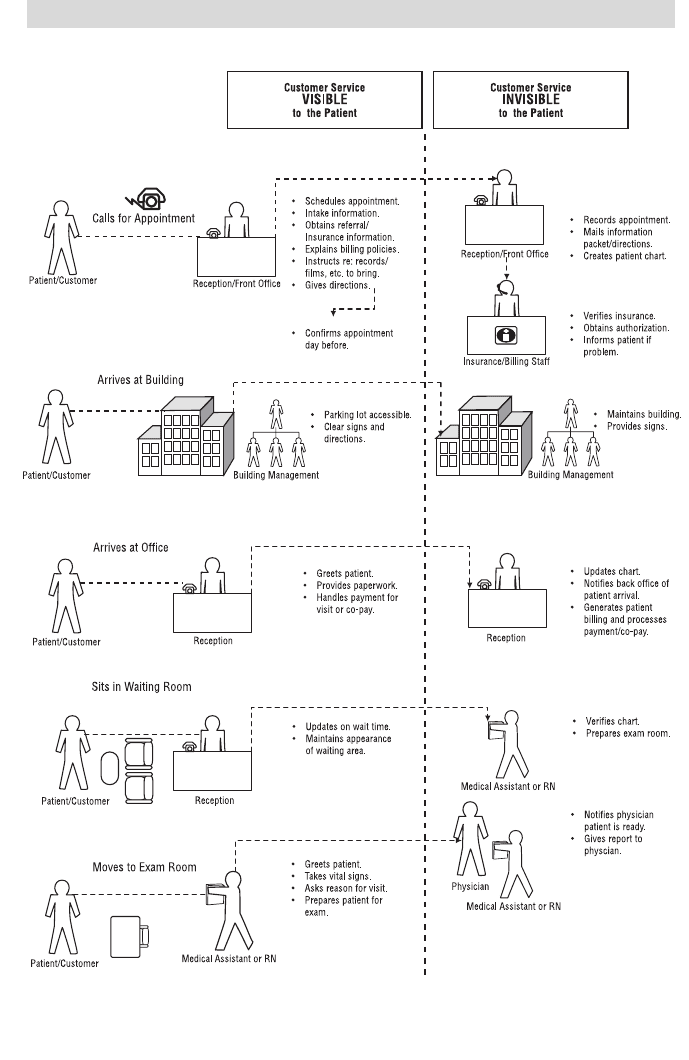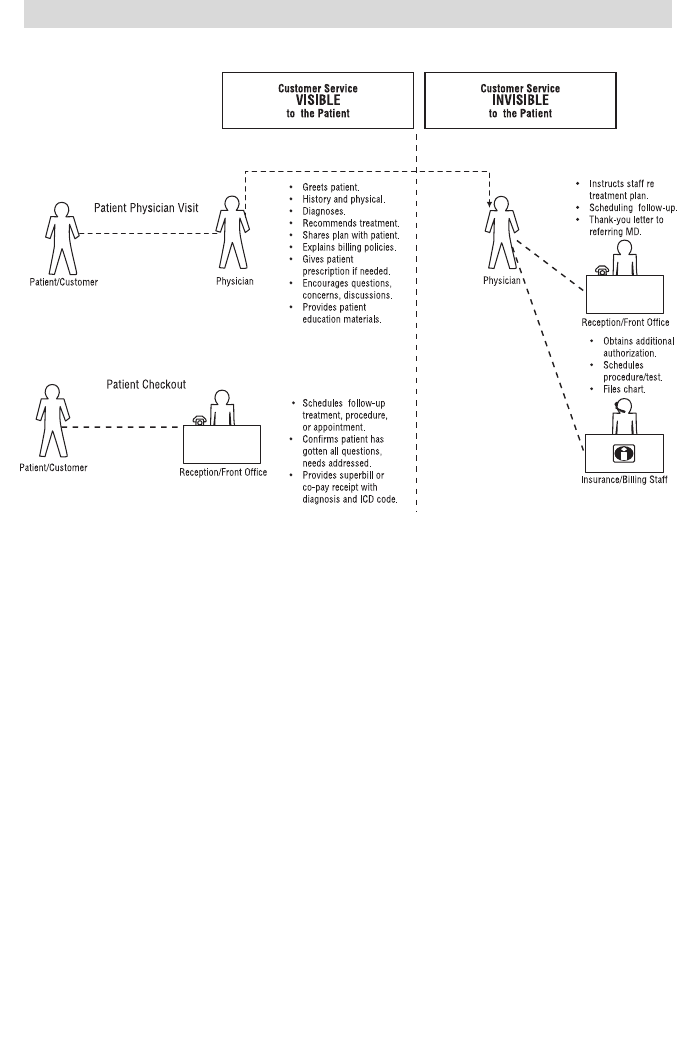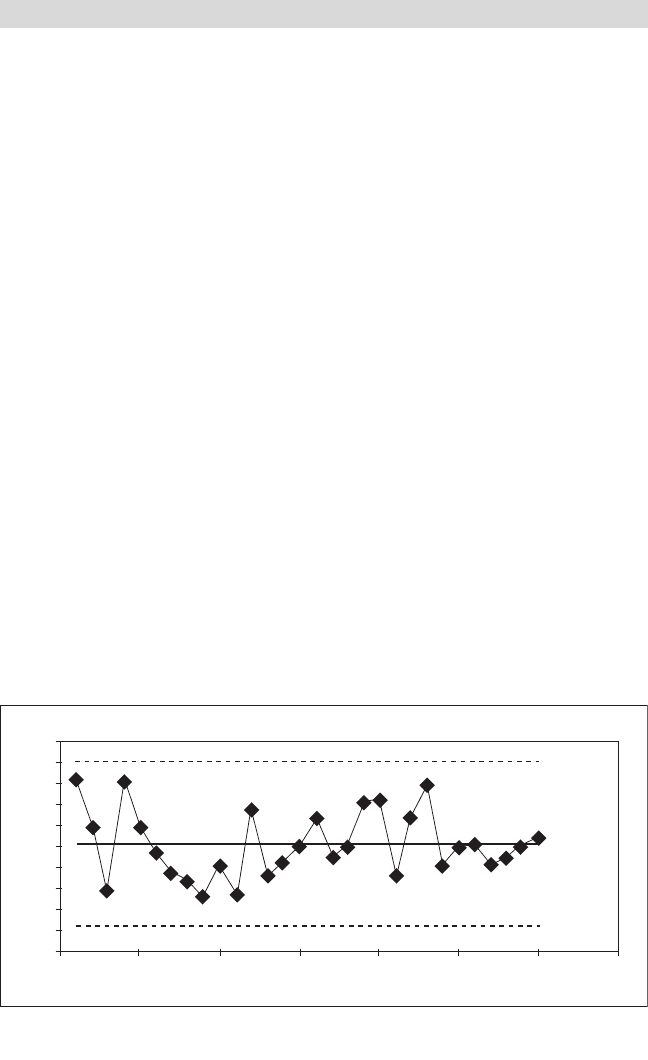MBA in a Day What You Would Learn at Top-Tier Business Schools (If You Only Had The Time!)
Подождите немного. Документ загружается.


Quality Management Systems
275
FIGURE 14.1 Service Map Example
ccc_stralser_ch14_264-288.qxd 7/22/04 9:08 AM Page 275
TLFeBOOK

from the organization’s strategy through to its business
processes. This order of priorities must be in place well before
the process enters the actual design phase.
3. Understand the current performance measurement system. Every
organization has some kind of measurement system in place.
For this reason, there are basically two ways to approach the de-
sign and implementation of a new performance measurement
system. Either you can scrap the old system and introduce a new
one as a replacement, or you can redevelop the existing system.
Both approaches can work, but the former approach is more
likely to lead to trouble. People will cling to the old measure-
ment system and either use both systems simultaneously or use
the old one and simply go through the motions of the new one.
You can eliminate this outcome by taking the second approach.
4. Develop performance indicators. The most important element of
a performance measurement system is the set of performance
indicators you will use to measure your organization’s perfor-
SYSTEMS AND PROCESSES
276
FIGURE 14.1 (Continued)
ccc_stralser_ch14_264-288.qxd 7/22/04 9:08 AM Page 276
TLFeBOOK

mance and business processes. This is the point in the design
process where the top-down approach meets the bottom-up
design approach and where the broad masses of the organiza-
tion become involved. The purpose of this step is to develop
the performance measurement system with an appropriate
number of relevant and accurate performance indicators.
5. Decide how to collect the required data. Developing perfect per-
formance indicators that will tell you everything you ever
wanted to know about what goes on in your organization is
one thing, but being able to collect the data required to calcu-
late these performance indicators is a completely different
matter. This issue must initially be addressed during the de-
velopment of the performance indicators so that you avoid se-
lecting those that can never actually be measured. There will
be trade-offs of cost and time versus the benefits of collecting
data, but a likely middle ground between perfect data/high
cost and no data/no cost will be found.
6. Design reporting and performance data representation formats.
In this step, you decide how the performance data will be pre-
sented to the users; how the users should apply the perfor-
mance data for management, monitoring, and improvement;
and who will have access to performance data. After you fin-
ish, you should have a performance measurement system that
has a solid place in your organization’s overall measurement-
based management system.
7. Test and adjust the performance measurement system. Your first
attempt at the performance measurement system will probably
not be perfect—there are bound to be performance indicators
that do not work as intended, conflicting indicators, undesir-
able behavior, and problems with data availability. This is to
be expected. In this step you should extensively test the sys-
tem and adjust the elements that do not work as planned.
8. Implement the performance measurement system. Now it’s time
to put your system to use. This is when the system is officially
in place and everyone can start using it. This step involves is-
sues such as managing user access, training, and demonstrat-
ing the system.
Quality Management Systems
277
ccc_stralser_ch14_264-288.qxd 7/22/04 9:08 AM Page 277
TLFeBOOK

This is not an absolute process that needs to be followed to the
letter in order for it to work. In some cases, one or more steps may be
unnecessary; in others, additional steps may be needed. It’s up to you
to make the necessary adjustments to the process to maximize the
probability of the system’s success.
Designing Part Two of the Quality System
This portion of the quality system is conceptual. It is more about man-
agement’s role in increasing motivation and the determination to make
the first part run smoothly. It is rooted in the communication between
management and employees, which was discussed earlier. In most
cases, the employees who are performing the activities and process
know how to improve the quality. This part of the system should allow
employees to make recommendations and motivate them to want to
improve quality.
Customers
The inclusion of customers in a quality program can take many dif-
ferent avenues, including the cost of losing a customer, the cus-
tomer’s perception of quality, and the satisfaction level of the
customers. The customer portion of a quality program is going to
be unique for every industry and organization, but it must capture
how quality plays into the customer’s value system and how quality
drives the purchase decision.
In service industries, in particular, quality is measured in cus-
tomer retention rates and the cost of losing a customer. If typical ac-
counting measures could capture the exact cost of losing a customer it
would be easy for managers to allocate the exact amount of resources
needed to retain customers. According to the Harvard Business Review,
companies can increase profits by almost 100 percent by retaining 5
percent more of their customers. Customers over time will generate
more profits the longer they stay with the same company.
Perceived quality by customers leads to referrals; in service in-
dustries, referrals can equate to more than 60 percent of new busi-
ness. If a company can increase the number of referrals through
SYSTEMS AND PROCESSES
278
ccc_stralser_ch14_264-288.qxd 7/22/04 9:08 AM Page 278
TLFeBOOK

increased quality, it is going to have a substantial effect on the bottom
line of the business.
Purchasing
Purchasing is an area in an organization where substantial gains in
quality can be realized through the implementation of just a few poli-
cies and procedures designed around quality. Today’s suppliers need to
be partners in the quality effort. A company’s products or services are
only as good as the combination of all the inputs.
The first step in molding the purchasing system to collaborate
with the entire quality system is to take all the standards developed for
all incoming materials that can be qualified as an input to routine
process or activity. If the quality system’s performance standards and
procedures are completed as described in the design phase these stan-
dards should already be established.
The second step is educating the purchasing personnel on how
the standards are important to the process flows of the organization.
If standards are not upheld, the quality of the product or service will
be jeopardized. The employees should also be educated on how to
measure and communicate the required standards. This may involve
materials or statistical process control education, and it could even
be as simple as cross-training the purchasing personnel so that they
know exactly how the inputs fit into the organization. Once the pur-
chasing area knows how the products are used and what problems
can arise, they will have a better chance of procuring inputs that
meet all the specifications.
Once steps one and two are complete it will be the purchasing de-
partment’s responsibility to communicate the requirements to suppli-
ers and hold them accountable for the quality. This sometimes may not
be a simple task and could involve finding new suppliers or working
with current suppliers to develop higher quality standards.
Education and Training
The education of employees for the purpose of reaching higher
quality standards has many different facets. For example, the quality
Quality Management Systems
279
ccc_stralser_ch14_264-288.qxd 7/22/04 9:08 AM Page 279
TLFeBOOK

education of management is going to be different than the quality
education of the general workforce, because they play different roles
in the process.
Because most quality problems start at the top, so too should edu-
cation. The education of management on quality issues should start
with a general discussion of quality systems and the roles management
plays in quality programs. With respect to general knowledge, manage-
ment must understand the history of the quality movement, who the
major players were, and how quality programs have affected the busi-
ness world. More specifically, managers must know how quality pro-
grams have affected their specific industry in the past, and they should
have an idea of what role quality programs play in the future of their
industry. Management must also keep abreast of new developments in
quality. The discussion of the roles that management must play in a
quality system is the most important aspect of their education. Man-
agement must understand how employees view their actions or inac-
tions, how their individual actions and jobs impact quality, and the
overall importance of dedication to quality by management. Managers
must understand that without strong leadership and reinforcing dedi-
cation to quality, a quality program will not be meaningful.
The education of employees for a quality program will include a
discussion of how these programs will affect their jobs on a daily basis.
It should also include a brief overview of quality as well as the tools
employees will use in order to ensure outputs and how their roles add
to the overall quality goals of the organization.
Data Development and Statistics
Statistical analysis is a very important aspect of quality systems. It
could be considered a cornerstone of the quality improvement process
and is very closely tied to auditing a quality system, which is dis-
cussed later in the chapter. Statistical process control (SPC) was what
Duran taught as a decision maker in quality systems. Statistical analy-
sis is the measurement portion of quality systems and allows it to be
managed. A very common saying in management, which relates well
to quality, is “you cannot manage what you cannot measure,” and sta-
tistical analysis will give you the measurements necessary to make
management decisions.
SYSTEMS AND PROCESSES
280
ccc_stralser_ch14_264-288.qxd 7/22/04 9:08 AM Page 280
TLFeBOOK

Statistics was a key tool that Deming used to distinguish between
systemic and special causes, and the key to quality management in
general was statistical process control. SPC was developed by Walter
Shewart while working at Bell Labs in the 1930s, and Deming took
Shewart’s concept and applied it to quality management. Deming be-
lieved that SPC was necessary because variation is a fact of life in any
process. Deming believed that it was very unlikely that two
products/services when produced by the same procedure and operator
would be identical.
Control Charts and Their Role in Quality Systems. Control
charts are the most widely used tool in quality systems. Control charts
communicate a lot of information effectively. Figure 14.2 shows a
process in which all the outcomes are within the specified limits. The
upper control limit (UCL) is .18 and the lower control limit (LCL) is
.02, and all the points fall between these two limits. This means the
process is in control and operating correctly. If some of the points were
to fall outside of the UCL or LCL, it would signal that the process is
not in control and action needs to be taken to correct the problem.
We discussed earlier the two different types of errors, (1) system-
atic and (2) special causes. Systematic errors will show up on a control
chart as one or two points outside of the control limits with the rest of
Quality Management Systems
281
0.2
0.18
0.16
0.14
0.10
0.1
0.08
0.06
0.04
0.02
0
0 5 10 15 20 25 30 35
UCL
LCL
FIGURE 14.2 Control Chart
ccc_stralser_ch14_264-288.qxd 7/22/04 9:08 AM Page 281
TLFeBOOK

the points within the limits. Special causes will show up on a control
chart with numerous points outside of the control limits.
The exact use of statistical measures is going to be different for
each organization. Some statistical analysis will be very easy to set up
and use. For example, the length or weight of a particular part can be
measured and analysis can show if the parts are within the required
specifications. In service industries the statistical analysis will be more
abstract, but is just as valuable. For example, one could survey cus-
tomers regularly and ask them on a scale of 1 to 10, “How would you
rate the service?”
Here are some common traits of statistical measures used in qual-
ity systems:
✔ Are driven by the customer.
✔ Reflect vision and values.
✔ Benchmarked to the competition.
✔ Are achievable.
Auditing
Auditing a quality management system is just as important as any
other aspect of the system. The audit process allows everyone involved
to see if the quality management system is working correctly and if the
goals and objectives are being reached. Auditing also plays major roles
in motivating employees and allows for rewards and acknowledgment
measures to be assessed as well as possible compensation.
Auditing of quality management systems can take many forms,
and each organization will have a unique auditing process that fits its
system. Service industries will have a very different auditing system
than a manufacturing organization, but the end result of the systems is
going to be the same. Here are some examples of auditing systems used
in service organizations.
Mystery Shoppers. Shoppers are sent to businesses to interact with
employees and assess the overall service quality and report back to
management. This is usually done on a regular basis, and reports are
produced for the employees.
SYSTEMS AND PROCESSES
282
ccc_stralser_ch14_264-288.qxd 7/22/04 9:08 AM Page 282
TLFeBOOK

Customer Surveys. Customer surveys are now well used as a
means to find out how your business is viewed by consumers. These
surveys can range from mail-in forms to short forms the consumers
complete at the time of purchase or even having a saleperson or clerk
asking the customer to rate the product or service at the close of the
purchase. Getting direct input from your customers is invaluable and
should be done in some form in every organization.
New Customer Measures. Measurement over time of the num-
ber of new customers can be a very effective tool to assess quality
levels. Customers who are very happy with your service are going to
tell others—60 percent of new customers in service organizations
come from referrals. New customers can be an important litmus test
of quality.
Quality in Services. Quality in service industries has more re-
cently come into the mainstream, and the benefits reaped by service
organizations initiating solid quality management programs have
been substantial. The basis for quality management systems in service
organizations is to proactively measure and manage the quality level
of the services; some of the metrics applied as the basis of service
quality are:
✔ The “iceberg principle,” in other words, the average service
company never hears from more than 90 percent of customers
who are not happy with the level of service they received. For
every legitimate complaint received there will be more than 20
customers who feel they have had problems, and at least 25
percent of those problems could be considered serious enough
to warrant investigation.
✔ Of the customers that make a complaint, more than half will
do business again if the complaint is addressed and resolved.
If the complaint is resolved quickly, and the customer feels the
organization cares about its customers, the number will jump
up to almost 100 percent.
✔ If a complaint is not resolved, the average customer will
tell more than eight other individuals about the negative
Quality Management Systems
283
ccc_stralser_ch14_264-288.qxd 7/22/04 9:08 AM Page 283
TLFeBOOK

experience. If the complaint is resolved, the customer will
tell at least five others about the positive experience.
✔ On average it costs six times more to gain a new customer
than to keep an existing one.
As you can see, quality in service industries can have substantial
influence on the bottom line. A well-designed and managed quality
system can be the key to providing the quality of service desired.
SUMMARY
The quality movement and quality systems have had many different
names or terms of reference in the past few decades, and might look like
a short-lived business management trend at first glance. With ever-
increasing competition and consumer expectations, professionals and
business managers cannot ignore quality issues and expect to maintain
or improve their competitive position. Quality systems, time and again,
have been responsible for substantial increases in the bottom line of
businesses in every industry and have given organizations the boost they
need to meet overall goals and objectives. Organizations that do not ac-
cept that quality improvement is going to be ingrained into every part of
their business are not going to be around to see what the future brings.
RESOURCES FOR QUALITY
Agency for Healthcare Research and Quality
www.ahrq.gov
A U.S. government agency established to improve the quality of
health care.
American Customer Satisfaction Index
www.theacsi.org
An organization dedicated to tracking customer satisfaction and
providing benchmarks and insights into customer satisfaction.
SYSTEMS AND PROCESSES
284
ccc_stralser_ch14_264-288.qxd 7/22/04 9:08 AM Page 284
TLFeBOOK
